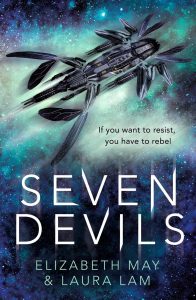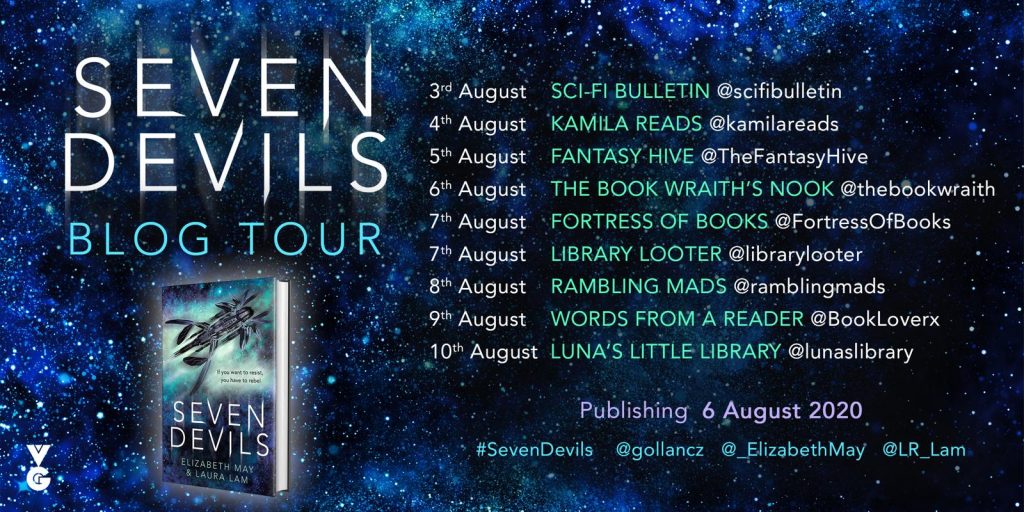Seven Devils by Elizabeth May and Laura Lam — Book Review
Published by: Gollancz
Genre: Science fiction
Series: Seven Devils #1 (of 2)
Pages: 448 (Hardcover)
Format: eARC
Review Copy: Courtesy of Will O’Mullane over at Gollancz
Release Date: August 6, 2020
 Rebellion is bloody business, but necessary – and with an ensemble as memorable as the one you’ll find within the pages of Seven Devils…quite a lot of fun, to boot.
Rebellion is bloody business, but necessary – and with an ensemble as memorable as the one you’ll find within the pages of Seven Devils…quite a lot of fun, to boot.
Science fiction is a medium well-suited to offering a social commentary while building up an engaging story and setting. Politically charged—to the tune of a message that goes a little like “Down with the patriarchy and toxic masculinity!”—this is a story that doesn’t shy away from the tyranny of empire. Violence, torture, and death are but a few of the more pronounced methods the Tholosian empire uses to maintain its galaxy-spanning influence. Far more subtle is the influence of the Oracle and of One, an AI always present in the thoughts of the empire’s populace, whispering commands in times of turmoil and putting all doubts and thoughts of disloyalty to sleep. Many aspects of life in service of the Empire are illustrated by example – the merciless nature of soldiers compelled to die before they break their orders; the indoctrination of children; and many more injustices this imperium perpetuates upon its own.
Seven Devils is rich in terms of intertextuality in regard to the naming conventions of the characters. Drawn chiefly from Greek and Roman mythology, our main cast consists of: Eris, formerly Discordia, the disillusioned heiress of a tyrannical space empire, now turned rebel; Cloelia, a mechanic and engineer for the Novantaen Resistance who knows Eris’s secret; Nyx, one of the Tholosian Empire’s most proficient and deadly killers, tired of all the blood on her hands; Rhea, a courtesan with a secret; and Ariadne, a prodigy who shares a special connection with the Oracle.
If I had to pick one character I was impressed with over all others, that would be Eris. It’s little surprise – she’s at the very centre of the conflict, and her decisions—past and present—have a causal relation to the current state of the Tholosian Empire, and beyond. She is in the unique position of possessing intimate knowledge about most (if not all) the major players of the galactic conflict at large; as such, her chapters are chock-full of insight about the ruler of the Empire, the Archon, as well as his heir—and Discordia’s brother—Damocles.
The significance of names goes beyond the characters: the resistance Clo and Eris are part of is named after Novantae, the southwestern-most region of Scotland as named by the Romans – and the continued allusions to Classical Antiquity hit the right note with me. For all that, I wouldn’t draw direct comparisons between the Tholosan empire and Ancient Rome. The name again hints at the authors’ intent. ‘Tholos’ comes from Ancient Greek and means “dome,” which is a type of enclosure, as we all know; in other words, a whole—with all the issues inherent to that particular form.
Several of the events later in the book affected me to the extent that I had to put it down and take a few days off before reading the last few chapters. As for the finale…it packs a hell of a punch and I wish I could tell you all about it!
A small grievance I had was with the curse words, most of them made up—if you’ve read some of my previous reviews, you might be aware that I’m of the opinion these can be hit or miss. I also have an issue with a certain revelation I won’t speak about for fear of spoilers; my problem with this revelation is, I saw it coming and a certain character or two should have, too. Apologies for keeping this so vague, but I’d get in trouble if I said more! The good news is, this one moment does not, in any way, spoil my enjoyment of the rest of the book. The characters are simply that enjoyable.
The themes of Seven Devils are of resistance against injustice; of the freedom to choose one’s path rather than be molded for the purposes of a society that is rotten at its core. It might not offer ruminations of vast political and philosophical depth and breadth as some other sci-fi, but its message will affect and absorb. There is a warning at the heart of Seven Devils, of the dangers of genetic engineering and biotechnological tinkering of the human being. It’s a relevant issue to examine, and the novel does it justice.
I am eager to see the second part of this duology come to life and reveal the fate of our quirky, battered rebels. Laura Lam and Elizabeth May have done wonderful work with this collaboration, and I am happy to recommend it to fans of sci-fi who enjoy high-adrenaline character-driven adventures! This one, with a generous helping of Ancient Greek family tragedy.

 Elizabeth May is the author of the YA fantasy trilogy The Falconer (The Falconer, The Vanishing Throne, The Fallen Kingdom), and short fiction published in the anthology Toil & Trouble. She was born and raised in California before moving to Scotland, where she earned her PhD at the University of St Andrews. She currently resides in Edinburgh, Scotland, with her husband and two cats.
Elizabeth May is the author of the YA fantasy trilogy The Falconer (The Falconer, The Vanishing Throne, The Fallen Kingdom), and short fiction published in the anthology Toil & Trouble. She was born and raised in California before moving to Scotland, where she earned her PhD at the University of St Andrews. She currently resides in Edinburgh, Scotland, with her husband and two cats.
Originally from sunny California, Laura Lam now lives in cloudy Scotland. Laura’s previous books include the BBC Radio 2 Book Club section False Hearts, the companion novel Shattered Minds, as well as the award-winning Micah Grey series: Pantomime, Shadowplay and Masquerade. Her short fiction and essays have also appeared in anthologies such as Nasty Women, Solaris Rising 3, Cranky Ladies of History, and more. She lectures part-time at Napier University in Edinburgh on the Creative Writing MA and at times misses the sunshine.
